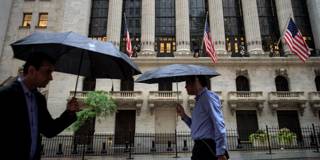Economists may warn that the combination of Trump’s protectionism, big tax cuts, and uncontrolled government borrowing, coming at a time when the US economy is already near full employment, will ultimately fuel inflationary pressure. But financial markets simply do not believe this message.
LONDON – As US President Donald Trump ratchets up his trade war with China and the Federal Reserve Board increases US interest rates, the prospects for the world economy and financial markets, so bright just a few months ago, appear to be darkening. Stock markets around the world have fallen back toward their February lows, business confidence has weakened in Europe and much of Asia, and policymakers worldwide are making nervous noises. Are these events the beginning of the end of the global economic expansion, or is the recent market turbulence just a false alarm?
Last month, I highlighted three indicators – the oil price, long-term US interest rates, and the dollar’s exchange rate – suggesting that global conditions would remain benign. Economists may warn that the combination of Trump’s protectionism, big tax cuts, and uncontrolled government borrowing, coming at a time when the US economy is already near full employment, will ultimately fuel inflationary pressure. But financial markets simply do not believe this message. And since the financial turbulence of early February, the message from the biggest and most important financial market – for US government bonds – has become even more reassuring.
Despite the Fed’s decision to raise short-term interest rates, and to signal more rate hikes than expected for 2019, interest rates on US ten-year bonds have fallen to levels well below their February peak. Thirty-year interest rates are now below their 2017 peak of around 3.25%. These interest-rate movements imply that bond investors are less worried today about inflation and economic overheating than they were before Trump’s tax cuts, protectionist measures, and the shift from budget consolidation to aggressive fiscal expansion.

LONDON – As US President Donald Trump ratchets up his trade war with China and the Federal Reserve Board increases US interest rates, the prospects for the world economy and financial markets, so bright just a few months ago, appear to be darkening. Stock markets around the world have fallen back toward their February lows, business confidence has weakened in Europe and much of Asia, and policymakers worldwide are making nervous noises. Are these events the beginning of the end of the global economic expansion, or is the recent market turbulence just a false alarm?
Last month, I highlighted three indicators – the oil price, long-term US interest rates, and the dollar’s exchange rate – suggesting that global conditions would remain benign. Economists may warn that the combination of Trump’s protectionism, big tax cuts, and uncontrolled government borrowing, coming at a time when the US economy is already near full employment, will ultimately fuel inflationary pressure. But financial markets simply do not believe this message. And since the financial turbulence of early February, the message from the biggest and most important financial market – for US government bonds – has become even more reassuring.
Despite the Fed’s decision to raise short-term interest rates, and to signal more rate hikes than expected for 2019, interest rates on US ten-year bonds have fallen to levels well below their February peak. Thirty-year interest rates are now below their 2017 peak of around 3.25%. These interest-rate movements imply that bond investors are less worried today about inflation and economic overheating than they were before Trump’s tax cuts, protectionist measures, and the shift from budget consolidation to aggressive fiscal expansion.